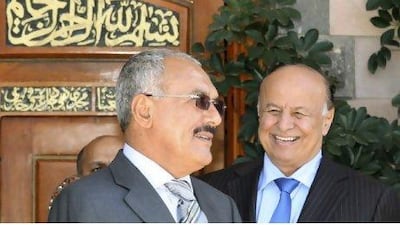SANA'A // A battle for the control of the Yemeni government in the absence of Ali Abdullah Saleh has pitted his son and other family members against the acting president and his supporters.
Abdurabuh Mansur Hadi, the acting president and secretary general of the ruling party, has been under pressure from the opposition, tribal leaders, youth protesters and the international community to facilitate the transition of power from Mr Saleh, who is receiving medical treatment in Saudi Arabia.
But Mr Hadi has to contend with Ahmed Saleh, the president's son and commander of the Republican Guard, and other relatives, who control the security and military apparatus. Ahmed Saleh moved into the presidential palace in the absence of his father, who was injured in a bomb attack on the palace on June 3.
Abdulbari Taher, an independent analyst and a freelance writer, said "The irony is that the vice-president who enjoys constitutional legitimacy is suspended while those who have no constitutional capacity are controlling the presidential palace and the army," said.
On Tuesday, Mr Hadi was offered support from General Ali Mohsen Al Ahmar, the military leader who defected in March, and Sheikh Sadiq Al Ahmar, a tribal chief who heads the influential Hashed tribal confederation, a source close to the chief said.
Hasan Zaid, a leader in the main opposition Joint Meeting Parties, said Ahmed Saleh is suspicious of the relationship between Mr Hadi and General Moshen, who had once been a strong ally of President Saleh but supported protests against the regime.
"Ahmed has doubts that Hadi has a good relationship with Ali Mohsen and this has crippled the transfer of power," Mr Zaid said.
"Mr Hadi has to either declare his position from Ali Mohsen or quit with him. Had Ali Mohsen accepted to leave with Saleh, the power would have been transferred," Mr Zaid said.
Ahmed Al Sufi, an aide to Mr Saleh, denied on Tuesday that there were divisions in the acting government. "It is not true that there are now power centres just three weeks after the temporary absence of the president," Mr Al Sufi said. "We are in the ruling party supporting the vice-president to boost the ceasefire and provide the basic services to the people. The idea of transferring power is not on our agenda, and such political issues will remain until the return of the president. This is what he [Hadi] has repeatedly underscored during his meetings with the US, EU, UK ambassadors and all diplomats.
"It is not true that Ahmed Saleh is controlling everything. He is an employee who follows the orders of the acting supreme commander of the armed forces," Mr Al Sufi said.
According to Abdulghani Al Iryani, an independent analyst, Mr Saleh's absence has increased the role of the ruling General People's Congress.
"He [Saleh] used some of the GPC leadership to maintain control and used the party as an instrument of control," Mr Al Iryani said. "Saleh relatives have taken over and they want to deal with the party as an instrument. Not one of them has thought the party should remain in the post-Saleh Yemen."
Mr Hadi and the international community see the party playing a bigger role in Yemen's future government.
"Hadi is only slowly and carefully beginning to assert his role as a constitutional and legitimate head of the executive," Mr Al Iryani said. He said if Mr Saleh's family continue to defy Mr Hadi "their popular support and sympathies, just like their ability to continue to control the military, would soon wither away".
"The other side has the constitutional legitimacy, the broad support of the people including the opposition and the unanimous support of the international community," Mr Al Iryani said.

